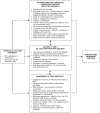Challenges in efficacy research: the case of feeding alternatives in patients with dementia
- PMID: 24612316
- PMCID: PMC4130777
- DOI: 10.1111/jan.12365
Challenges in efficacy research: the case of feeding alternatives in patients with dementia
Abstract
Aims: To explore factors at the family caregiver and nursing home administrative levels that may affect participation in a clinical trial to determine the efficacy of hand feeding vs. percutaneous gastrostomy tube feeding in persons with late-stage dementia.
Background: Decision-making regarding use of tube feeding vs. hand feeding for persons with late-stage dementia is fraught with practical, emotional and ethical issues and is not informed by high levels of evidence.
Design: Qualitative case study.
Methods: Transcripts of focus groups with family caregivers were reviewed for themes guided by behavioural theory. Analyses of notes from contacts with nursing home administrators and staff were reviewed for themes guided by an organizational readiness model. Data were collected between the years 2009-2012.
Results: Factors related to caregiver willingness to participate included understanding of the prognosis of dementia, perceptions of feeding needs and clarity about research protocols. Nursing home willingness to participate was influenced by corporate approval, concerns about legal and regulatory issues, and prior relationships with investigators.
Conclusion: Participation in rigorous trials requires lengthy navigation of complex corporate requirements and training competent study staff. Objective deliberation by caregivers will depend on appropriate recruitment timing, design of recruitment materials and understanding of study requirements. The clinical standards and policy environment and the secular trends there-in have relevance to the responses of people at all levels.
Keywords: caregiving; decision-making; dementia; nursing home care; nutrition; research in practice.
© 2014 John Wiley & Sons Ltd.
Conflict of interest statement
No conflict of interest has been declared by the authors.
Figures
Similar articles
-
Effectiveness of interventions to improve family-staff relationships in the care of people with dementia in residential aged care: a systematic review protocol.JBI Database System Rev Implement Rep. 2015 Nov;13(11):52-63. doi: 10.11124/jbisrir-2015-2415. JBI Database System Rev Implement Rep. 2015. PMID: 26657464
-
Successful clinical trial research in nursing homes: the Improving Decision-Making Study.Clin Trials. 2010 Dec;7(6):735-43. doi: 10.1177/1740774510380241. Epub 2010 Aug 20. Clin Trials. 2010. PMID: 20729251 Free PMC article.
-
Refining a Digital Therapeutic Platform for Home Care Agencies in Dementia Care to Elicit Stakeholder Feedback: Focus Group Study With Stakeholders.JMIR Aging. 2022 Mar 2;5(1):e32516. doi: 10.2196/32516. JMIR Aging. 2022. PMID: 35234657 Free PMC article.
-
Remotely delivered information, training and support for informal caregivers of people with dementia.Cochrane Database Syst Rev. 2021 Jan 4;1(1):CD006440. doi: 10.1002/14651858.CD006440.pub3. Cochrane Database Syst Rev. 2021. PMID: 33417236 Free PMC article.
-
Outcomes of family involvement in care intervention for caregivers of individuals with dementia.Nurs Res. 2004 Mar-Apr;53(2):76-86. doi: 10.1097/00006199-200403000-00003. Nurs Res. 2004. PMID: 15084992 Review.
Cited by
-
Experiences and needs of home caregivers for enteral nutrition: A systematic review of qualitative research.Nurs Open. 2022 Jan;9(1):11-21. doi: 10.1002/nop2.990. Epub 2021 Jul 17. Nurs Open. 2022. PMID: 34273248 Free PMC article.
-
Aspiration pneumonia in nursing literature-a mapping review.Front Rehabil Sci. 2024 Jul 24;5:1393368. doi: 10.3389/fresc.2024.1393368. eCollection 2024. Front Rehabil Sci. 2024. PMID: 39113687 Free PMC article.
-
Challenges of conducting research in long-term care facilities: a systematic review.BMC Geriatr. 2018 Oct 12;18(1):242. doi: 10.1186/s12877-018-0934-9. BMC Geriatr. 2018. PMID: 30314472 Free PMC article.
-
High tech and high touch: Recruitment strategies for enrolling African American stroke survivors in Community Based Intervention under Nurse Guidance after stroke (CINGS) trial.Contemp Clin Trials Commun. 2021 Sep 8;24:100844. doi: 10.1016/j.conctc.2021.100844. eCollection 2021 Dec. Contemp Clin Trials Commun. 2021. PMID: 34541374 Free PMC article.
-
Feasibility, acceptability, and tolerability of RGN107 in the palliative wound care management of chronic wound symptoms.J Wound Care. 2017 Jan 2;26(Sup1):S25-S34. doi: 10.12968/jowc.2017.26.Sup1.S25. J Wound Care. 2017. PMID: 28105900 Free PMC article.
References
-
- Alzheimer’s Association. [accessed 03/23/2013];2012 Alzheimer’s Disease Facts and Figures [on-line report] 2012 Retrieved from http://www.alz.org/downloads/facts_figures_2012.pdf.
-
- Amella EJ. Factors influencing the proportion of food consumed by nursing home residents with dementia. Journal of the American Geriatrics Society. 1999;47(7):879–885. - PubMed
-
- American Geriatrics Society. [Accessed October 12, 2013];Feeding Tubes in Advanced Dementia Position Statement. www.americangeriatrics.org/files/documents/feeding.tubes.advanced.dement... - PubMed
Publication types
MeSH terms
Grants and funding
LinkOut - more resources
Full Text Sources
Other Literature Sources
Medical



